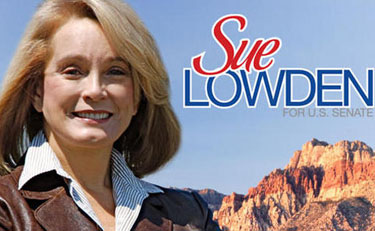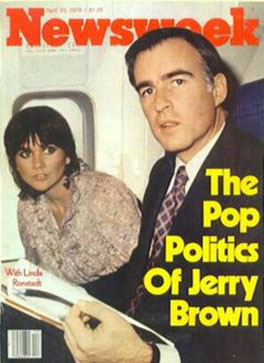American politics as a perpetual election .. or Super Duper Tuesday 2010 : a view from the northern lights
Jun 8th, 2010 | By L. Frank Bunting | Category: In Brief
Will the former Miss New Jersey (1973), Sue Lowden, win the Republican nomination as looney right challenger to Democrat Harry Reid as US Senator from Nevada? And can she really beat Harry Reid in the fall? UPDATE: No she did not, and the lady who did win is apparently even loonier.
“The radio crosses boundaries which stopped the press,” the near-great Canadian economic historian Harold Innis declared in the late 1930s, in a talk on “Canadian-American Relations” at the University of Maine. Television just stiffened the trend, starting in the 1950s. And now the Age of the Internet, starting in the 1990s, is crossing boundaries all over the world.
Canadians have in any case always paid a lot of attention to American politics. But I’ve found myself doing this more and more as I get older in the early 21st century. I know I am far from alone. Today, on Tuesday, June 8, 2010 – so-called “Super Duper Tuesday” on the US political calendar – the subject is almost overwhelming, even on the north shore of Lake Ontario.
The main event is “ the biggest primary day of the year! Eleven states – from California to Arkansas to Maine (and everywhere in between) – are voting today.” For an overview of some key details, try Chris Cillizza in the Washington Post: “Super Duper Tuesday: What to Watch For.” For a slightly deeper taste of what so many observers seem to find so entertaining this year, try eg (from the the same publication): “Sen. Lincoln’s missteps put her at risk in today’s Ark. runoff” ; “Fiorina campaigning on her record at HP” ; “Nev. Senate: Lowden reflects on campaign missteps” ; and “What to watch for, Virginia primaries edition.”
What struck me most last night, watching the excitement of assorted pundits on US TV was the extent to which American politics has become a kind of perpetual election – and how this is, in various respects, both a good and a bad thing. The primaries today are of course just a prelude to the real elections this coming fall. And this fall, along with various Senate and Gubernatorial contests, every seat in the US House of Representatives is up for election. (House members only serve two-year terms.)Â As a recent learned paper on the subject explains: “Very few other countries use party plebiscites to nominate their candidates, but the United States has employed primary elections widely for nearly 100 years … American politicians face many more electoral battles than any other politicians in the world.”
In theory the good side to all this is that more elections mean more politicians are more accountable to the sovereign people in democracy in America. There probably still is some virtue to this argument. But, just for starters, the majority of the American people involved will not be turning out for today’s primaries. (See, eg: “California turnout could reach record low.”) And the amount of money it now takes to run even in the primaries has increasingly made democracy in America too much a captive of the American plutocracy. (See “Meg Whitman Shatters Campaign Spending Records … The former eBay CEO has spent more than $81 million so far,” just on trying to become the Republican candidate for Governor of California in this fall’s election.)

Even if Meg Whitman does win the Republican nomination tonight, she will still have to beat the aging Democrat Jerry Brown in the fall, who, as explained by the gossip website Wonkette, has already been “governor of California in the 1970s, when he was also banging the hell out of Linda Ronstadt, in a trashy apartment across the street from the governor’s mansion in Sacramento.” UPDATE: Meg did win, but Jerry does not seem too scared. And LFB only wishes he knew where Ms. Ronstadt is now: so he could write her a fan letter.
The British-style parliamentary democracy we still have in Canada has somewhat different traditions – which could be seen at work in their perhaps purest form in the May 6, 2010 British general election. Our recent passion for electing minority governments in Canadian federal politics has sometimes seemed to bring us closer to the concept of (North?) American politics as a perpetual election. And like others on this site, I too want to see the end of the obsolete symbolism of the British monarchy in Canada, and soon enough. Yet parliamentary democracy – which at its best has as much to do with peace, order, and good government as with raw plutocratic politics – is one legacy of our colonial past that I think we should be taking pains to hang onto. (As have such other former British dominions as the parliamentary democratic republics of Ireland and India.) Canadian politics were once characterized as “American actors on an English stage.” I’d be happy to see this description gain some fresh popularity today. But I will still be watching the primaries on US TV tonight – even though it does seem a very good guess that Meg Whitman’s vast eBay fortune will easily give her the Republican gubernatorial nomination in the Golden State (which actually has a somewhat larger population than all of Canada!).


[…] 21st century. I know I am far from alone. Today, on Tuesday, June 8, … Read the original: American politics as a perpetual election .. or Super Duper … Share and […]